2023届高考高三英语二轮复习专题:动词的时态和语态课件(共106张PPT)
文档属性
| 名称 | 2023届高考高三英语二轮复习专题:动词的时态和语态课件(共106张PPT) |  | |
| 格式 | pptx | ||
| 文件大小 | 5.5MB | ||
| 资源类型 | 教案 | ||
| 版本资源 | 通用版 | ||
| 科目 | 英语 | ||
| 更新时间 | 2023-05-19 20:57:36 | ||
图片预览

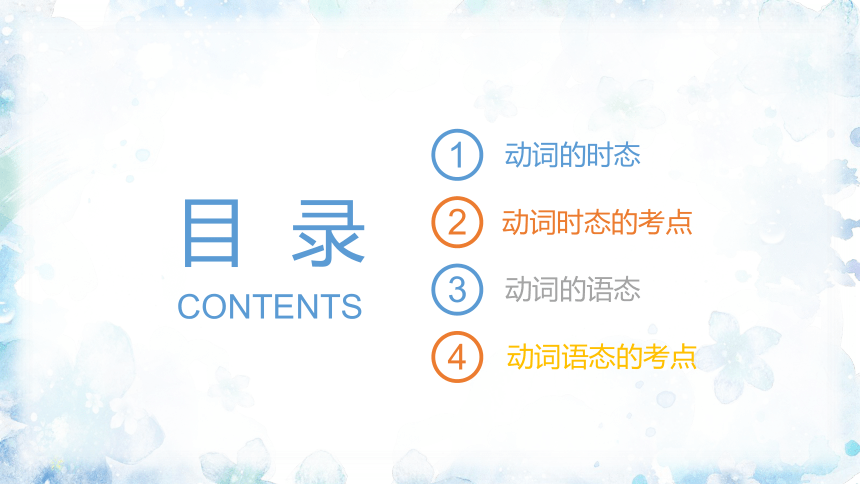

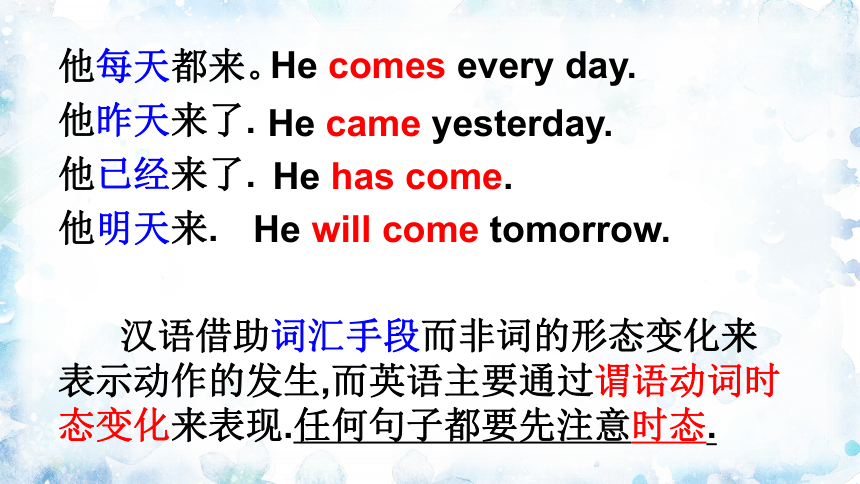
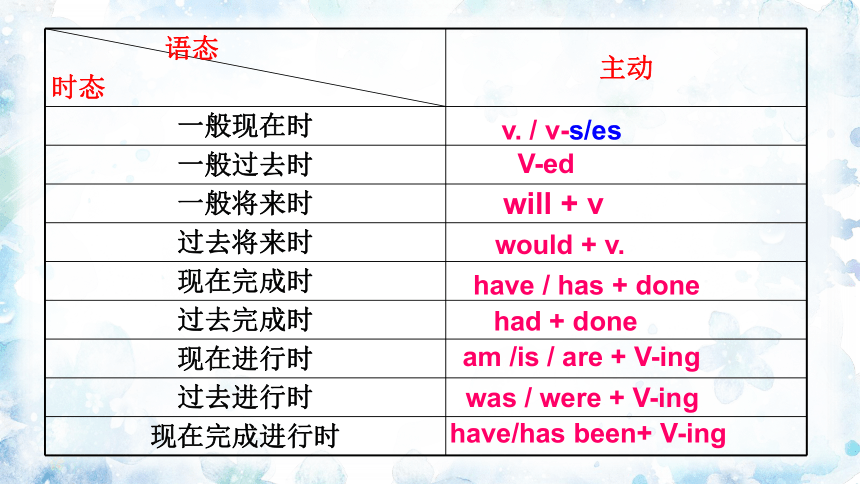
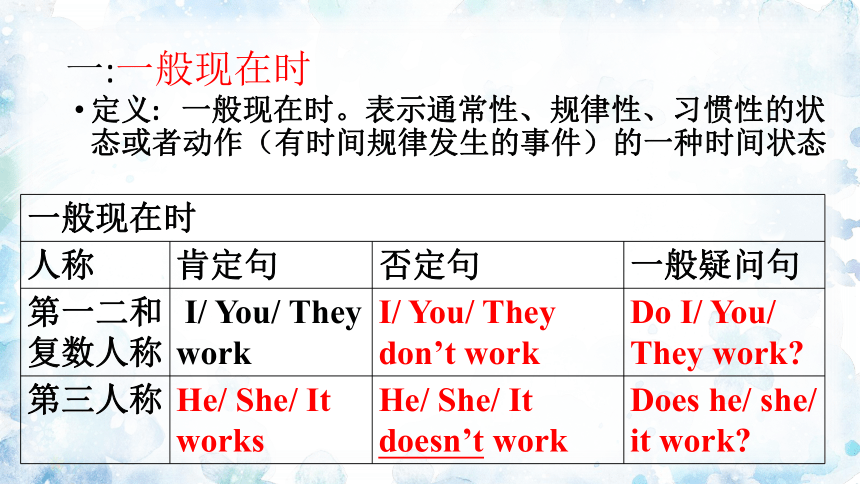
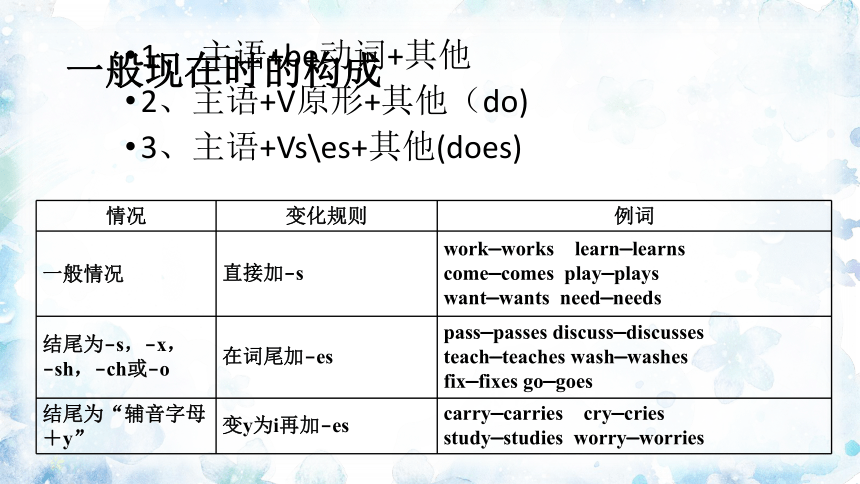

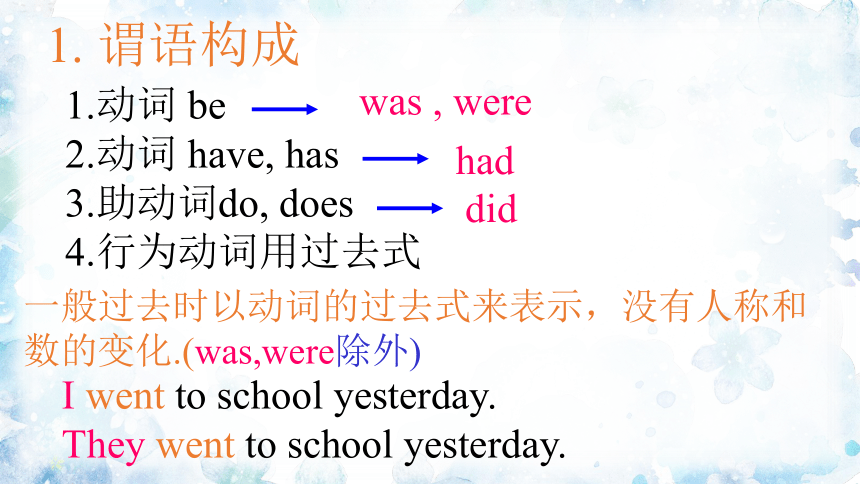
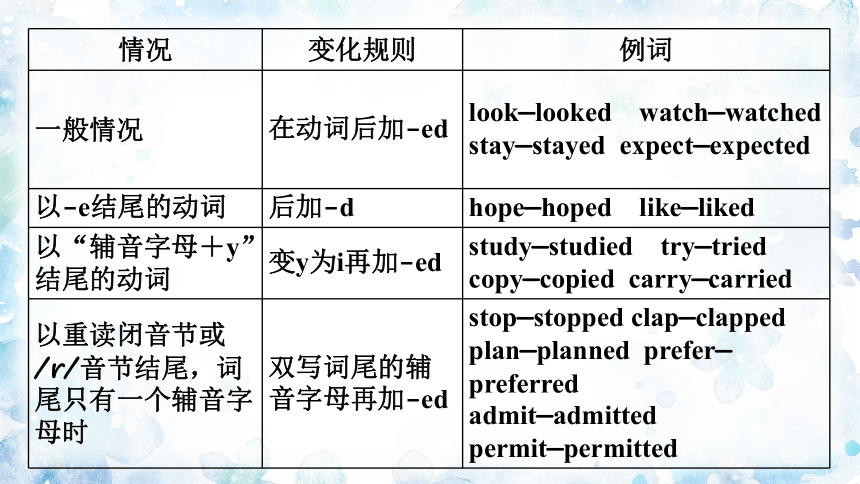
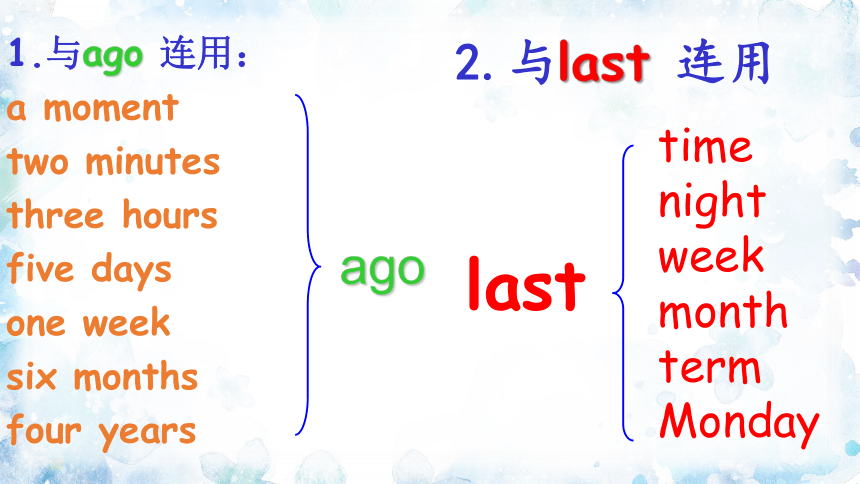
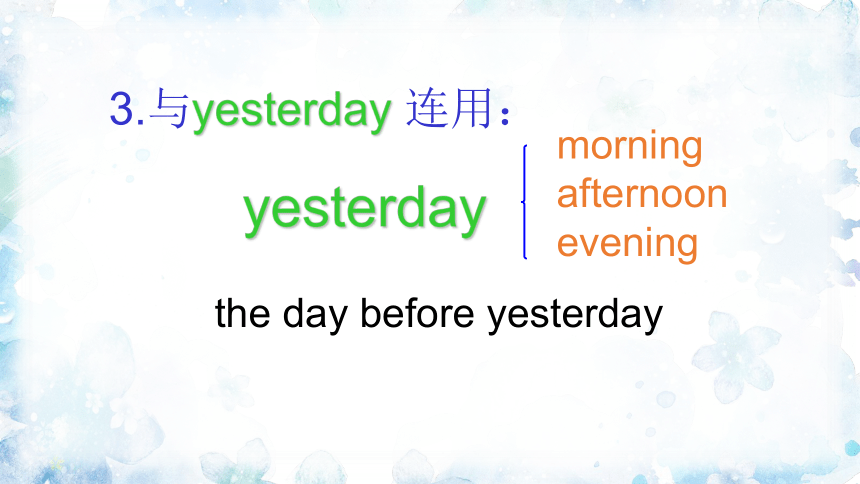
文档简介
(共106张PPT)
动词的时态和语态
目 录
CONTENTS
1
2
3
4
动词的时态
动词时态的考点
动词的语态
动词语态的考点
01
动词的时态
他每天都来。
他昨天来了.
他已经来了.
他明天来.
汉语借助词汇手段而非词的形态变化来表示动作的发生,而英语主要通过谓语动词时态变化来表现.任何句子都要先注意时态.
He came yesterday.
He has come.
He will come tomorrow.
He comes every day.
语态 时态 主动
一般现在时
一般过去时
一般将来时
过去将来时
现在完成时
过去完成时
现在进行时
过去进行时
现在完成进行时
v. / v-s/es
V-ed
will + v
would + v.
had + done
have / has + done
have/has been+ V-ing
am /is / are + V-ing
was / were + V-ing
一:一般现在时
定义: 一般现在时。表示通常性、规律性、习惯性的状态或者动作(有时间规律发生的事件)的一种时间状态
一般现在时 人称 肯定句 否定句 一般疑问句
第一二和复数人称 I/ You/ They work I/ You/ They don’t work Do I/ You/ They work
第三人称 He/ She/ It works He/ She/ It doesn’t work Does he/ she/ it work
情况 变化规则 例词
一般情况 直接加 s work—works learn—learns
come—comes play—plays
want—wants need—needs
结尾为 s, x, sh, ch或 o 在词尾加 es pass—passes discuss—discusses
teach—teaches wash—washes
fix—fixes go—goes
结尾为“辅音字母+y” 变y为i再加 es carry—carries cry—cries
study—studies worry—worries
一般现在时的构成
1、 主语+be动词+其他
2、主语+V原形+其他(do)
3、主语+Vs\es+其他(does)
二:一般过去时
定义:动词的一般过去时态表示过去发生的动作、情况或存在的状态。
人称 肯定句 否定句 一般疑问句
第一三人称 (I, he, she, it) was wasn’t Was提前
worked didn’t work Did……work
第二和复数人称(we, you,they) were weren’t Were提前
worked didn’t work Did……work
1. 谓语构成
1.动词 be
2.动词 have, has
3.助动词do, does
4.行为动词用过去式
was , were
had
did
一般过去时以动词的过去式来表示,没有人称和数的变化.(was,were除外)
I went to school yesterday.
They went to school yesterday.
情况 变化规则 例词
一般情况 在动词后加 ed look—looked watch—watched
stay—stayed expect—expected
以 e结尾的动词 后加 d hope—hoped like—liked
以“辅音字母+y”结尾的动词 变y为i再加 ed study—studied try—tried
copy—copied carry—carried
以重读闭音节或/r/音节结尾,词尾只有一个辅音字母时 双写词尾的辅音字母再加 ed stop—stopped clap—clapped
plan—planned prefer—preferred
admit—admitted
permit—permitted
1.与ago 连用:
a moment
two minutes
three hours
five days
one week
six months
four years
ago
last
time
night
week
month
term
Monday
2.与last 连用
yesterday
morning
afternoon
evening
the day before yesterday
3.与yesterday 连用:
4.与one 连用:
one
morning
evening
day
Monday afternoon
5.与that 连用:
that
morning
winter
day
year
just now
in the old days
in those days
in 1980
the other day
at that time
once upon a time
6.其他时间状语:
____ you ________ (remember) to buy the oranges yesterday
2.Who ________ (invent) the computer.
3.We _____ (go) to the cinema last night. The film _____ (be) very good.
4.What time ____ you ____ (get) to school this morning
5.Jim ___ (do) a lot yesterday. He ____ (go) shopping and ______ (cook) supper.
6. He usually ____ (get) up at 6 in the morning. Look! He ______ (get) up now. But yesterday he ____ (get) up very late, so he ____ (go) to school late.
Did
remember
invented
went
was
did
get
did
went
cooked
gets
is getting
got
went
一般过去时用在虚拟语气中
1如果我是你,我会带把伞.(事实我不可能是你)
If I were you,I would take an umbrella.
2.如果我知道他的电话号码,我就会告诉你.(事实不知道)
If I knew his telephone number,I would tell you.
2.如果下周日下大雪,我们就不能去滑冰了.(事实不知能否下雪)
If there were a heavy snow next Sunday,we would not go skating.
3如果她下周一来这儿的话,我就会告诉她这件事的始末
If she were to be here next Monday,I would tell her about the matter.
Would rather 从句中
would rather后可接从句,从句用一般过去式,即
would rather sb. did sth.
表示宁愿某人现在或将来要做某事;
他宁愿你周五来 He’d rather you came on Friday
would rather sb. had done sth.
表示宁愿某人过去做过某事。如:
我宁愿你那天没有告诉他那个消息
I’d rather you hadn’t told him the news that day.
It is (high/about) time that 从句中
I think it is time that they were taught a lesson.
It is time I was in bed.
也可以用
Should + 动原
should 不省
1.结构:
肯定句:主语+ will +do+其他
People will have robots in their homes.
否定句:主语+ will not /won't+do+其他
People will not/won’t have robots in their homes.
一般疑问句:Will+主语+do+其他?
肯定回答:Yes, 主 will
否定回答:No, 主won’t.
特殊疑问:疑问词+will +主+V原+····?
will/shall+ V原(shall仅第一人称)
三. 一般将来时
一般将来时 人称 肯定句 否定句 一般疑问句
第一人称(I) am going to am not going to
be提前
第三人称 (He, she , it) is going to isn’t going to 第二和复数人称 (We, you , they) are going to aren’t going to 所有人称 will work won’t work Will 提前
2.时间状语(判断标准):
tomorrow 明天
next week 下周
the day after tomorrow 后天
soon 不久
in the future 在将来
in+一段时间 多久之后才...
3.一般将来时的几种构成形式
1.will+动词原形 (I /we shall)
2.be going to+动词原形
3.be+to do 表示计划,责任,约定或命令
4. be about to do sth
表示正要做…,马上要做...
(不能与表示将来时间的状语连用)
5.be+v-ing
6.一般现在时表将来
1.will与shall+v
1)表示一个将来的动作或状态,“要…,会…”
She will go to the park tomorrow.
2)表示不以人的意志为转移的自然发展的事。
Tom will be 18 next year.
Spring will come again.
Tomorrow will be Sunday.
3) will+v 有时表示说话是临时决定或打算。
--- My car won’t start.
---Don’t worry, I will come and give it a push.
2、be going to
①表示计划,安排要做的事
②表示现在的迹象推断未来可能发生某事。
--- What ________________do this evening
--- I am going to do my lessons.
看那些乌云要下雨了.
Loot at the dark clouds. It __________rain.
is going to
are you going to
3.be to do
①表按计划或安排即将发生的动作
②表示约定,责任,命令,或注定要发生的动作。
③官方计划或决定(常见于报纸或广播)
He and I are to meet at the railway station tomorrow.
You are not to be back late.
If not watered, the plants are to die.
The president is to speak on TV tonight.
计划,安排
责任,命令
注定要发生的动作
官方计划或决定
4.be about to do 表示正要做…,马上要做...
(不能与表示将来的时间的状语连用)
was /were about to do … when…
正要…突然发生…
英语晚会即将开始。
The English Evening Party is about to begin.
我正要出去,这时下起了雨.
I was about to go out when it began to rain.
5.be +v-ing
go, come, leave, start, arrive, stay, fly, land, take off等动词可用现在进行时表示安排和计划或即将发生的动作。
我们明天动身去青岛.
We’re leaving for Qingdao.
6.表示与生日,日历,课时安排或交通时刻表有关的动作(一种规律) ,用一般现在时表示将来时态
常用于转移动词如:
begin, come , leave, go, arrive, start, stop, return, open, close…
The evening class begins at 19:00.
火车两点出发.
The train starts at two.
注:在时间或条件状语从句中,从句用一般现在时表示将来时:when, as soon as,
before, once, if , unless, even if, in case
If you come this morning, we will have a meeting.
When I graduate, I will go to the countryside.
现在进行时 表示现在(即说话人说话的时刻)正在进行的动作或正在发生的事情,现在进行时的标志性词语有now, look, at the moment, listen等
现在进行时的基本构成:
主语+be动词+现在分词
Eg:
draw
are
ing
They
pictures.
四. 现在进行时
现在分词的构成规则:
1.一般在动词词尾加-ing,如:read-reading
2.以不发音e结尾,去e加-ing,
如:write-writing
3.以重读闭音节结尾的动词,末尾只有一个辅音字母,应先双写这一字母,再加-ing。
Eg:swim-swimming run-running
cut-cutting shop-shopping sit-sitting
特殊变化:lie-lying平躺,die-dying死亡
情况 变化规则 例词
一般情况 在词尾直接加 ing work—working
look—looking
study—studying
以不发音的e结尾的动词 去e再加 ing have—having face—facing
take—taking write—writing
以重读闭音节结尾,且末尾只有一个辅音字母 双写该辅音字母再加 ing cut—cutting
put—putting
swim—swimming
begin—beginning
以 ie结尾的动词 变ie为y再加 ing lie—lying tie—tying
die—dying
现在进行时的句式:
1.肯定句—主语+be+doing
Eg: I am doing my homework.
2.否定句—主语+be+not+doing
Eg: I am not doing my homework.
3.一般疑问句—be提到句首(注意人称变化)
Eg: Are you doing your homework
下面的动词不用现在进行时:
1.表示心理情感的动词: want;mind;wish recognize;think;know;understand;hate;depend on
2.表示存在位置的动词: remain;stand
3.表示知觉的动词:see; hear; notice; smell
4.表示所属的动词: have; possess; own; consist of
5.暂时性的动词: accept;allow;decide; promise
五. 过去进行时(The Past Continuous Tense)
1. 结构:was/ were + doing
2. 用法:表示过去某时或某段时间正在进行的动作或状态。常用的时间状语
at ten yesterday, from nine to ten last evening, when…, while…, at that time…
I first met Lisa three years ago . She ____ at a radio
shop at the time.
has worked B. was working
C. had been working D. had worked
√
他总是考虑别人,从未考虑自己。
3. 与always,forever,constantly连用,表示赞成或厌恶的感彩。
He was always thinking of others,never thinking of himself.
4.表示位置移动的动词如come, go, leave, fly, set off等用过去进行时表示按计划,安排过去某时刻将要发生的动作。例:
He said they were leaving for Beijing the next day.
他说他们第二天要去北京。
七. 现在完成时(The present Perfect Tense)
结构: have (has) + done
概念:表示发生在过去,持续到现在,可能刚刚结束也有可能继续进行下去的动作或状态,甚至延续到将来,并对现在造成一定的影响或结果。常与since+过去时(间), for+一段时间连用。
时间状语:yet, already, just, never, ever, so far, by now, since+时间点,for+时间段,recently, lately, in the past few years, etc.
He has lived here since last summer.
时间线
现在
过去
lived
延续到现在:has lived
last summer
since…
现在完成时 人称 肯定 否定 疑问
第一二和复数人称 (I, we, you, they) have worked Haven’t worked Have提前
第三人称 (He, she, it) has worked Hasn’t worked Has 提前
比较一般过去时与现在完成时
1). 一般过去时只表示发生在过去的动作或存在的状态, 不涉及对现在的影响;现在完成时表示发生在过去的动作或状态一直延续到现在, 或强调过去的事情对现在的造成的影响。
My family lived in Zhuhai 10 years ago.
(现在不在珠海了)
My family have lived in Zhuhai for 10 years.
(目前还在珠海)
2). 过去时常与具体的表示过去的时间状语连用,而现在完成时通常与不确定的或包括现在在内的时间状语连用,或无时间状语.
I ______ (study) in Zhongshan university in 2000.
I ___________ (study) in Zhongshan university since 2000.
I _____ just _______ (buy) an apartment.
(just表示不确定的时间状语)
studied
have studied
have
bought
注意:
非延续性动词不能与表示延续时间的状语(since…;for…)连用。但其否定形式则可以。
1)They have married for ten years.
2) I have received his letter a month ago.
3) I haven't received his letter for a month.
F
F
T
have been married
They got married ten years ago.
八.过去完成时 (The past perfect Tense)
结构: had + done
概念:表示过去的过去
----|--------------|---------|---->
过去的过去 过去 现在 将来
By the end of last term we had learnt 20 units.
现在
过去
过去的过去
the end of
last term
had learnt
时间线
用法
(1) 表示过去某一时刻或某一动作之前完成的动作或状态。句中常用by,before,until,when等词引导的时间状语。如:
2.表示过去未曾实现的愿望或打算(“本想”; “本来打算”)。
I had hoped to see more of ShangHai.
I had meant to help you, but I was too busy at the moment.
I had thought you would come tomorrow.
3、常用于下列句型中:
1) Hardly /No sooner…(过去完成时)when /than…(一般过去时)。
2) It /This /That was the time that…(从句用过去完成时)。
3) It was +一段时间+since(从句用过去完成时)。
1).When the police arrived, the thieves _________________(run away).
2).When I came into the classroom, my dear students ______________ (begin) reading.
He walked in as if he __________ (buy) the school .(12广东)
had run away
had run away
had run away
had begun
had bought
十、现在完成进行时
主语 + has / have + been +doing….
表示过去某一时间发生一直持续到现在还会继续下去的动作(动作未完成),动词必须用延续性动词。
He has been working here for three years.
The number of foreign students attending Chinese universities has been rising steadily since 1990.
现在完成时与现在完成进行时的区别
现在完成时:表到现在为止已经完成,或过去发生的动作对现在的影响或产生的结果,也可表示延续性;
现在完成进行时: 往往强调仍将继续下去的动作。
I have written a letter. (已完成)
I have been writing a letter.(未完成)
过去
现在
时间线
have written
have been writing
一般现在时
现在进行时
现在完成时
现在完成进行时
often, always, usually, sometimes, on Sunday, every …, at weekends, once in a while, three times a day…
(right) now, at this moment, at present, for the time being, this year, always, …
for, since, so far, in/over/during thepast/ last few years, lately, recently, just, up to now, up till now, already, yet, ever, never, twice, three times, before, …
all the time, all this morning, for, since, in the past few years, …
一般过去时
过去进行时
过去完成时
过去将来时
yesterday, last…, the day before yesterday, …ago, in 2000, in the past, the other day, just now, once upon a time,…
at 10 last night, then, this morning, at that time/ moment, this time yesterday, last year, always, …
by+过去时间,by then, by the end of + 过去时间,by the time you did sth,…..
一般将来时
将来进行时
将来完成时
tomorrow, the day after tomorrow, in 2020, in a few years, in future, in the future, soon, next…, another day, …
at 10 tomorrow, then, this time tomorrow, next year, …
by +将来时间, by then, by the end of + 将来时间, by the time you do sth, …
02
动词时态的考点
◆1.一般现在时考点分析
(1)表示客观事实或普遍真理(不受时态限制)。
Time and tide wait for no man.
(2)看时间状语(上下文语境暗示)
(3)表示知觉、态度、感情、某种抽象的关系或概念的词,see,hear,smell,taste,feel,notice,agree,believe,like,hate,want,think,belong to,seem等。
(4)在时间、条件状语从句中常用一般现在时代替将来时。
考题点击1、2
1. Months ago we sailed ten thousand miles across this open sea, which ___ the Pacific, and we met no storms. A.was called B.is called
C.had been called D.has been called
2. I _____ ping-pong quite well, but I haven’t had time to play since the new year.
A. will play B. have played C. played D. play
B
本题的干扰源为上下文的过去时,但“被称为太平洋”是客观事实,只能用一般现在时。
常识告诉我们,一个人一旦获得某种技能,一般是不会在短期内失去的,所以需用一般现在时。
D
考题点击3 I don’t know when he ____, but when he ____, I will let you know. A. will come, will come B. comes, comes C. will come, comes D. comes, will come
C
第一个when引导宾语从句,从句表将来用一般将来时态。第二个when引导时间状语从句,只能用一般现在时态表将来。还有条件、让步状语从句也如此。这时,主句用一般将来时,从句用一般现在时,“主将从现”。
If you __________(不去) there tomorrow, _______________ (我也不去).
_______________________________(无论你给他多少建议), he will do exactly what he wants.
Take an umbrella ______________(以防下雨).
neither/nor will I
However much advice you give him
in case it rains
don’t go
The next train _______(leave) at 3 o’clock this afternoon.
The film _________(start) at seven o’clock and _________(end) at nine o’clock this evening.
The plane _________(take) off at 8:00a.m.. It is 7:10a.m. now. We must hurry up.
leaves
starts
ends
takes
4. 一般现在时表示按安排或计划要做的动作(有具体的时间状语)。限于come, go, leave, begin, start, end, open, close, return, arrive, take off, stop, depart等。
The film, ____________(start) at seven o’clock, attracted many young people.
starting
Translation:
铃响了。
Here comes the bus.
There goes the bell.
用于倒装句,表示动作正在进行。
= The bus is coming.
= The bell is ringing.
Make sure that all the windows ____________ (close) before you leave the room.
are closed
make sure (that) 后面的宾语从句中用一般现在时态。
写作句型:随着…而来的是… 倒装句
Along with…, there come(s) …
Along with the physical changes, there come some psychological changes.
公共汽车来了。
2.一般过去时考点分析
(1)看时间状语(上下文语境暗示);
(2)表示两个紧接着发生的动作,由以下词语连接,常用一般过去时。如:but,and,when,as soon as,immediately,the moment,the minute等。
比较 He will come to the party if he ________ (be) free. He said he ___________(come) to the party if he ________(be) free.
is
would come
was
is, was 表示现在和过去将要发生的动作。
时态呼应原则:当主句谓语动词为一般过去时态,宾语从句只能用相应的过去时态(一过、过进、过完、过将),除非是客观真理,总用一般现在时。
I didn’t know where _____ my purse. A. have I put B. had I put C. I have put D. I had put
D
根据时态呼应原则排除A,C,根据陈述句语序选D
◆When Alice came to, she did not know how long she ______ there. A. had been lying B. has been lying C. was lying D. has lain
◆The moment I got home, I found I ____ my wallet on the playground. A. had left B. has left C. have left D. was leaving
A
A
根据时态呼应原则排除B,C,根据时间先后选A
根据时态呼应原则排除B,D,根据时间的先后选A
◆ Edward, you play so well. But I _____ you played the piano. A. didn’t know B. hadn’t known C. don’t know D. haven’t known
A
C,D与现在有关,表示现在不知道。根据句意,指过去不知道,现在已知道B表过去的过去,这里只表现在的过去。
◆--- Alan is ill in hospital. ---- Oh, really I _____________ (not, know). I __________(go) and visit her.
◆What a nice house! I _______________(never, think) that one day I ________________( live) in such a beautiful house.
◆---Alice, here is your car key, in the drawer. ---- Thank you. I _______________(not, realize) that I _____________(leave) it here.
didn’t know
will go
never thought
would live
didn’t realize
had left
Alice _____ in America for 10 years, but she never regrets she has come back to China. A. has worked B. worked C. had worked D. has been working
B
It is said in the book that Thomas Edison (1847-1931)____ the world leading inventor for 60 years. A. would be B. had been C. has been D. was
易错题
D
误选A,但现在完成时是包括现在的时间在内的。这里表已经回来了,在美国工作成为了过去,用一般过去时。
for 60 years 未必只能和现在完成时连用。这里是讲述过去一段时间的经历,用一般过去时。
It is time you ____________________ (承担责任). It is time you ___________________(进行休学实践年).
took on the responsibility
took the gap year
It is time (that) sb. did sth. 虚拟语气: “该做某事的时候了”。
_______________ (如果我是你的话), I would distribute the money to the poor.
________________ (如果我有一百万), I would travel to every point of the compass.
If I were you
If I had a million dollars
If 虚拟条件句中,与现在事实相反的假设,用一般过去时表示。
It was not long before they _________(occupy) the city center
It was not long since they __________ (occupy) the city center.
occupied
不久之后就…
had occupied
自从…有多久了
3.现在完成时考点分析
(1)for,since,介词短语:during/in/over the last(past) few years(months,weeks...),in recent years,so far,up to now等。
(2)几个句型。
It is(has been)+一段时间+since从句
This(That/It) is the first(second...) time that+现在完成时
This(That/It) is the best/finest/most interesting...+that+现在完成时
考题点击4、5
4._____ my sister three times today but her line was always busy.
A. I’d phoned B. I’ve been phoning
C. I’ve phoned D. I was phoning
5. Though we don’t know what was discussed, but we can feel the topic _____. A. had changed B. will change C. was changed D. has been changed
C
D
此题的干扰源是后面的 was busy。今天打了三次电话是用来表示结果的,只能用现在完成时;而每次她都占线是表示过去的动作,所以用一般过去时。
尽管不知道讨论过什么,但感觉话题已经改换了,表示结果。
◆ ---- _____ you ______ (have) lunch yet ----- Yes. I _______(have) lunch at home.
Have
had
had
到现在为止是否已经吃饭了,强调结果,用现在完成时。回答时表具体在哪里吃的,表过去的动作,用一般过去时。
◆ It is the most instructive lecture that I ________________ (ever, attend) .
have ever attended
在“最高级+名词” 之后跟定语从句,从句用现在完成时。
◆ This is the first time that I _____________ (visit) your country.
have visited
It / This is the first/second/ last… time that 从句中用现在完成时。 It / This was the first/second/last…time that从句中用过去完成时。
◆That man can’t be Green; he _____ to the USA. A. went B. has gone C. has been to D. had gone
B
went只表过去曾经去过某地,和现在没关系。 has gone to 表去…了(或到了或在途中), has been to 去过…(已回来)
◆ We will set off at once if the rain ____________ (stop).
You’d better not give up this job until you ___________ (find) a better one.
has stopped
have found
用于时间、条件状语从句中,表示从句动作先于主句动作之前完成
◆ The book, which became the best-seller, was written by Arthur’s wife, Joan, whom he ___________________ (marry) for 52 years.
has been married to
marry 是终止性动词,不可与延续性状语for, since 等连用,需把终止性动词变成可延续的动词形式be married to 。其它词有:
die--- come---
leave-- begin—
join--- become—
borrow--- buy---
get in touch with---
fall in love with---
be dead
be here
be away (from)
be on
be in
be
keep
have
be in touch with
be in love with
4.一般将来时考点分析
(1)看时间状语,tomorrow,next week,其他表达方式be going to do,be to do,be about to do等。
(2)表示趋向行为的动词如come,go,start,begin,leave等词常用进行时的形式表示将来时。
The students are leaving on Sunday.
---Look! The lights in the room are still on. You must have forgotten to turn them off. --- Sorry, I _____ to turn them off now. A. will go B. am going C. am to go D. have gone
A
will do 通常指纯粹的将来或事先未计划好的,临时性的决定 be going to 表事先有计划的意图,是经过考虑的。侧重于说话者个人意图或打算。也表某种客观迹象预示即将会发生。 be to 表按计划、安排将要发生的动作,侧重于受别人的指示或安排。表由于客观因素或不受人的控制将要发生的动作,只用be going to,不用be to
It is going to rain. Am I to finish the work on my own I am going to try my best to help her.
客观迹象 别人安排 个人意图
be to do sth. 的几种用法:
A tall building is to be built in this area.
(按计划安排)打算、将要做
Nobody is to leave the room without my permission.
(按命令、指示、约定、要求等) 必须,必要,应该做
Troubles never come singly. The worst is still to come.
表后来命运注定会发生
If you are to pass the exam, you will have to study harder from now on.
(用于条件句) 想,想要做
Stand higher, and you ________(see) farther. Study hard, or you ________ (fall) behind others.
will see
will fall
祈使句+ and / or + 一般将来时 …, 就会/ 否则…
It _______(be) long before he shows up again.
will be
It will be … before sb. does sth. 多久之后才/ 就…
If you plant watermelon seeds in the spring, you ____ fresh watermelon in the fall. A. eat B. would eat C. have eaten D. will be eating
D
在春天种下西瓜子,将在秋天收获新鲜的西瓜。相当于will eat
Will be doing 在单纯表示未来动作时可以代替will do, 但如表示说话者主观意图, 邀请或允诺时,通常用will do
Will you be having dinner at home this evening
Will you have dinner at home this evening
Will you have dinner with me this evening 邀请
By the time Jane gets home, her aunt ____for London to attend a meeting. A. will leave B. leaves C. will have left D. left
C
将来完成时的用法:
到将来某个时间为止将已经完成的动作或存在的状态。
By next month, we ______________(save) enough for a used car.
By 10 a.m. tomorrow, I ___________________ (finish) the speech and _______________(have) a chat with the students then.
will have saved
will have finished
will be having
5.现在进行时考点分析
(1)表示说话时正在发生着的一个动作;表示现阶段但不一定是讲话时正在进行的动作;表示近期特定的安排或计划;go,come等表示移动的动词可用进行时代替将来时;与always,often等频度副词连用,表示经常反复的行为或某种感彩。
He is working on a paper.
She is teaching English and learning Chinese.
I am meeting Mr Wang tonight.
We are leaving on Friday.
The girl is always talking loud in public.
考题点击6、7 6. Since I won the big prize, my telephone hasn't stopped ringing. People _____ to ask how I am going to spend the money.
A. phone B. will phone C. were phoning D. are phoning
7. Selecting a mobile phone for personal use is no easy task because technology _____ so rapidly.
A. is changing B. has changed
C. will have changed D. will change
D
自从我赢了大奖,人们不停地打电话来问我将怎样使用这笔钱。此处的 are phoning 表示“在不停的打电话”。
A
选择移动电话难的原因是由于科技正在飞速发展,表日新月异的变化,所以要用现在进行时。
◆We must look around when _________(cross) the road.
Take care while ________(ride) a bicycle.
crossing
riding
when we are crossing the road
while you are riding a bicycle
省略句:时间、条件、让步状语从句中如果是现在进行时态,引导词后可省略主语和be动词,直接用v-ing的形式。
◆_____________________________________(参加会议的有700学生) from Peking University.
______________________________(一幅画挂在墙上) by Qi Baishi.
Attending the meeting are 700 students
Hanging on the wall is a painting
倒装句:现在进行时态的句子,可以把doing表语提到句首,用全部倒装。Doing+ be+主语。
5.过去完成时考点分析
(1)常用过去完成时的几种情况。
①在by,by the end of,by the time,until,before,since后接表示过去某一时间的短语或从句的句子中。
By the end of last year,we had produced 20,000 cars.
The train had left before we reached the station.
②表示未曾实现的希望、打算、意图、诺言等,常用had hoped/planned/meant/intended/thought/wanted/expected等或用上述动词的过去式接不定式的完成式,即:hoped/planned...+to have done。
We had planned to finish the work before dark,but we were held up by a heavy rain.
③“时间名词+before”在句中作状语,谓语动词用过去完成时;“时间名词+ago”在句中作状语,谓语动词用一般过去时。
He said his first teacher had died at least 10 years before.
Xiao Hua left school three years ago.
④在hardly/scarcely...when...,no sooner...than...句式中,主句常用过去完成时,表示“一……就……”。当hardly,scarcely,no sooner置于句首时,其后要用部分倒装。
We had no sooner been seated than the bus started.=No sooner had we been seated than the bus started.
1. The little girl ____ her heart out because she ____ her toy bear and believed she wasn’t ever going to find it.
A. had cried, lost B. cried, had lost
C. has cried, has lost D. cries, has lost
2. — Hurry up! Alice and Sue are waiting for you at the school gate.
— Oh! I thought they _____ without me.
A. went B. are going C. have gone D. had gone
B
D
根据时态呼应原则排除B,C。“他没叫我就走了”这个动作明显发生在“我认为”之前。所以必须用过去完成时。
哭得伤心发生在过去,而丢玩具熊发生在哭之前。两个发生在过去的动作,之前发生的用过去完成时,之后发生的用一般过去时。
If you ___________(win) the first place in the last exam, you _____________(get) the iPad as a gift from your father. But you didn’t.
had won
would have got
虚拟语气中与过去事实相反的假设,if从句用过去完成时。
How I wish I ___________(take) your advice last time. If only you ____________(donate) more money yesterday. I’d rather you ___________(tell) him the truth when you saw him last time.
had taken
had donated
had told
Wish, if only, would rather后的宾语从句中的虚拟语气用过去完成时表与过去事实相反的假设。
Twenty years ago nobody could predict he _____ such a famous scientist. A. became B. will become C. have become D. would become
The discovery of gold in Australia led thousands to believe that a fortune ____. A. is made B. would make C. was to be made D. had made
D
C
20年前预测未来,表过去的将来,用过去将来时。
过去的一个发现使得人们相信将来可以发财,是过去将来。
6. 现在完成进行时的用法:
She is very tired. She has been typing letters all day.
All these years they have been contributing articles to our magazine.
1. 表示从过去某一时刻开始的动作一直延续到现在,甚至会延续到将来(强调延续)。
2. 到现在为止的一段时间里一再反复发生的动作。
8.--- Hi, Tracy, you look tired.
--- I am tired. I _____ the living room all day.
A. painted B. had painted
C. have been painting D. have painted
9. Now that she is out of a job, Lucy______ going back to school, but she hasn’t decided yet.
A had considered B has been considering
C considered D is going to consider
她“一直在考虑返校”是现在完成进行时,“还没作决定”是现在的结果。
C
B
这句话的意思是“我一整天都在刷起居室”,现在完成进行时表示从过去开始的一个动作一直持续到现在,而且还在进行当中。强调的是“一直在做”。
10. --- Nancy is not coming tonight.
--- But she _____!
A. promises B. promised C. will promise D. had promised
11. My uncle _____ until he was forty-five.
A. married B. didn’t marry
C. was not marrying D. would marry
Nancy 答应要来这个动作应该发生在过去,是过去作出的承诺。
until 用在肯定句中时,主句的动词必须是延续性动词,表示该动作一直持续到 until 后的时间为止;短暂性动词只能用在否定句中,表示直到此时该动作才开始。本题中 marry 是短暂性动词,所以只能用在否定句中。
B
B
12. --- You haven’t said a word about my new coat, Brenda. Do you like it
--- I’m sorry I _______ anything about it sooner. I certainly think it’s pretty on you.
A. wasn’t saying B. don’t say C. won’t say D. didn’t say
本题的干扰源来自上下文中的时态,上文用的是现在完成时,下文用的是一般现在时,所以有些人就误以为此处该用现在时态了。但根据说话人的意思不难发现,没有说出自己的评价是在这段对话以前的事了,所以要用一般过去时。
D
7. 过去进行时的用法:
The first time I saw her , she was standing in his study.
He was writing a novel last year, but I don’t know if he has finished it.
He was constantly leaving things here and there at that time.
He said he was coming to see you the next month.
1. 过去每一时刻正在进行的动作,除有上下文暗示外,一般和时间状语连用。
2. 过去某一时间段正在进行的动作。
3. 与always或constantly连用,表示说话人过去对主语的行为表赞叹或厌恶等。
4. 表过去将要发生的动作,一般限于表移动,方向的动词。
I was wondering if I could ask you a question
My brother fell while he was riding his bicycle and hurt himself.
5. 某些表心理活动的词,用于过去进行时, 表示委婉、客气,而不表过去。
6. 描述一件事情发生的背景。
考题点击13
13. The manager had fallen asleep where he _____, without undressing.
A. was laying B. was lying C. had laid D. had lied
B
该题的意思为“经理躺在那儿睡着了,衣服也没脱”。
“躺”是一个不及物动词,其过去式和过去分词为“lay; lain”。lay 是及物动词,过去式和过去分词为 laid;lied 是“说谎”的过去式和过去分词。
14. As she ____the newspaper, Granny ____asleep.
A. read, was falling B. was reading, fell
C. was reading, was falling D. read , fell
一般来说在复合句中的两个动作,延续性的动作(长动作)大都用过去进行时,短暂性的动作(短动作)用一般过去时,表示在某个动作进行的过程当中另一个动作发生了。
B
◆They ____________(have) a meeting when the fire ________(break) out. ◆Jane ___________(meet) Frank while she ______________(live) in Holleywood. ◆The UFO __________(travel) from east to west when I _________(see) it.
were having
broke
met
was living
was travelling
saw
---- Please repeat what I said just now. ---- Sorry, I _____. A. didn’t listen B. wasn’t listening C. hadn’t listened D. won’t listen
B
when you said it.
---- We could have got in for nothing. ---- Yes, nobody ____ tickets. A. collected B. has collected C. was collecting D. had collected
C
when we got in.
在隐含过去进行时,表示“当时正在做某事”时,可以在后面加上when从句理解。
比较: He __________ (write) a novel last year. He __________a novel last year, but I don’t know whether he has finished it.
wrote
was writing
当时正在写
写完了
8. 过去将来时的其它表示:
Last Friday we decided we were going to the Great Wall.
It was reported that another bridge was to be built across the Yangtze River.
He didn’t know when you were coming.
He was about to dive when he saw a shark.
She was on the point of leaving when I arrived.
was / were going to do sth. 打算
was / were to do sth 打算、计划
was / were doing sth. 将要
was / were about to do sth. 就要、正要
was / were on the point of doing sth. 正要
句型:
…正在做某事,这时…
…正要去做某事,这时…
…就要去做某事,这时..
was / were doing sth. when …did sth.
was / were about to do sth. when …did sth.
Was / were on the point of doing sth. when … did sth.
If a man _____ succeed, he must work as hard as he can.
A. will B. is to C. is going to D. should
--- You’ve left the light on.
--- Oh, so I have. _____ and turn it off.
A. I’ll go B. I’ve gone C. I go D. I’m going
B
A
此句的意思为“如果一个人想要成功,就必须尽力而为”。If 引导的是条件状语从句,不能用将来时。而 be to 结构虽然表示将来的动作,但它不属于将来时。
Will do 表临时做出的决定。
03
动词的语态
形态 时间 一般 进行 完成
现在 am/is/are cleaned am/is/are being cleaned have/has been
cleaned
过去 was/were cleaned was/were being cleaned had been cleaned
将来 shall/will be cleaned shall/will have
been cleaned
过去将来 should/would be cleaned
被动语态的表示:
一般时态:
进行时态:
将来时态:
完成时态:
宁愿被:
最好被:
打算被:
过去常常被
情态动词
is / am / are /was /were done
is/ am / are/ was/ were being done
will/ would be done
have / has/ had been done
would rather be done
had better be done
be going to be done; be to be done
used to be done
情态动词+ be done
04
动词语态的考点
The book ______ (sell) well. By today 50,000 copies _______________(sell) out.
sells
have been sold
sell well 强调主语的特性,主动表被动。第二个 sell强调被卖掉的动作。
主动表被动
1. 某些“不及物动词+副词(easily, well, smoothly, quickly, badly等)” ,说明主语的特性。动词有lock, open, close, sell, bend, print, cut, wash, read, write, wear, tear, cook等。
易撕 书写流畅
易洗 好读
熟得快 打印质量差
易弯曲
tear easily
wash easily
cook quickly
bend easily
write smoothly
read smoothly
print badly
I want to taste the food _______(smell) delicious. The method _________________(already, prove) practical.
smelling
has already proved
2. 系动词look, sound, taste, smell, feel, prove, remain, seem等无被动语态,作定语,用doing
The novel is interesting __________(read). We find the box heavy __________(carry).
to read
to carry
3. Sth. is +adj. + to do. I find/ think/ make/ feel sth. + adj. + to do. to do是主动表被动
The car ___________ (开不动了). The door of the classroom ___________ (锁不上).
won’t move
wouldn’t lock
4. 某些与won’t, wouldn’t 连用的不及物动词如lock, open, close, move, print, shut等, 用主动表被动。
I have a letter _________(type), so I can’t go with you. With a lot of problems _________ (solve), I am at a loss now.
to type
to solve
5. have sth. to do; There is sth. to do.; with sth. to do. 有…要做
比较:He asked me if I had anything ___________ (type).
to be typed
type 的逻辑主语不是I,用have sth. to be done
It is I that ___________ (blame) for the incident.
am to blame
6. sb. is to blame (for sth.). 该怪…,…该负责任
The question is well worth _________ (discuss). The naughty boy deserves __________(criticize).
discussing
7. sth. is (well) worth doing. 很值得(被)… deserve doing …值得被…,…应该受到…
The computer needs ____________(repair).
repairing
8. sth. needs / wants / requires doing. 需要被…
criticizing
The car is too old __________(drive).
to drive
9. Sth. is too… to do . 太…而不能… Sth. is …enough to do. 足够…去…
THANK YOU
动词的时态和语态
目 录
CONTENTS
1
2
3
4
动词的时态
动词时态的考点
动词的语态
动词语态的考点
01
动词的时态
他每天都来。
他昨天来了.
他已经来了.
他明天来.
汉语借助词汇手段而非词的形态变化来表示动作的发生,而英语主要通过谓语动词时态变化来表现.任何句子都要先注意时态.
He came yesterday.
He has come.
He will come tomorrow.
He comes every day.
语态 时态 主动
一般现在时
一般过去时
一般将来时
过去将来时
现在完成时
过去完成时
现在进行时
过去进行时
现在完成进行时
v. / v-s/es
V-ed
will + v
would + v.
had + done
have / has + done
have/has been+ V-ing
am /is / are + V-ing
was / were + V-ing
一:一般现在时
定义: 一般现在时。表示通常性、规律性、习惯性的状态或者动作(有时间规律发生的事件)的一种时间状态
一般现在时 人称 肯定句 否定句 一般疑问句
第一二和复数人称 I/ You/ They work I/ You/ They don’t work Do I/ You/ They work
第三人称 He/ She/ It works He/ She/ It doesn’t work Does he/ she/ it work
情况 变化规则 例词
一般情况 直接加 s work—works learn—learns
come—comes play—plays
want—wants need—needs
结尾为 s, x, sh, ch或 o 在词尾加 es pass—passes discuss—discusses
teach—teaches wash—washes
fix—fixes go—goes
结尾为“辅音字母+y” 变y为i再加 es carry—carries cry—cries
study—studies worry—worries
一般现在时的构成
1、 主语+be动词+其他
2、主语+V原形+其他(do)
3、主语+Vs\es+其他(does)
二:一般过去时
定义:动词的一般过去时态表示过去发生的动作、情况或存在的状态。
人称 肯定句 否定句 一般疑问句
第一三人称 (I, he, she, it) was wasn’t Was提前
worked didn’t work Did……work
第二和复数人称(we, you,they) were weren’t Were提前
worked didn’t work Did……work
1. 谓语构成
1.动词 be
2.动词 have, has
3.助动词do, does
4.行为动词用过去式
was , were
had
did
一般过去时以动词的过去式来表示,没有人称和数的变化.(was,were除外)
I went to school yesterday.
They went to school yesterday.
情况 变化规则 例词
一般情况 在动词后加 ed look—looked watch—watched
stay—stayed expect—expected
以 e结尾的动词 后加 d hope—hoped like—liked
以“辅音字母+y”结尾的动词 变y为i再加 ed study—studied try—tried
copy—copied carry—carried
以重读闭音节或/r/音节结尾,词尾只有一个辅音字母时 双写词尾的辅音字母再加 ed stop—stopped clap—clapped
plan—planned prefer—preferred
admit—admitted
permit—permitted
1.与ago 连用:
a moment
two minutes
three hours
five days
one week
six months
four years
ago
last
time
night
week
month
term
Monday
2.与last 连用
yesterday
morning
afternoon
evening
the day before yesterday
3.与yesterday 连用:
4.与one 连用:
one
morning
evening
day
Monday afternoon
5.与that 连用:
that
morning
winter
day
year
just now
in the old days
in those days
in 1980
the other day
at that time
once upon a time
6.其他时间状语:
____ you ________ (remember) to buy the oranges yesterday
2.Who ________ (invent) the computer.
3.We _____ (go) to the cinema last night. The film _____ (be) very good.
4.What time ____ you ____ (get) to school this morning
5.Jim ___ (do) a lot yesterday. He ____ (go) shopping and ______ (cook) supper.
6. He usually ____ (get) up at 6 in the morning. Look! He ______ (get) up now. But yesterday he ____ (get) up very late, so he ____ (go) to school late.
Did
remember
invented
went
was
did
get
did
went
cooked
gets
is getting
got
went
一般过去时用在虚拟语气中
1如果我是你,我会带把伞.(事实我不可能是你)
If I were you,I would take an umbrella.
2.如果我知道他的电话号码,我就会告诉你.(事实不知道)
If I knew his telephone number,I would tell you.
2.如果下周日下大雪,我们就不能去滑冰了.(事实不知能否下雪)
If there were a heavy snow next Sunday,we would not go skating.
3如果她下周一来这儿的话,我就会告诉她这件事的始末
If she were to be here next Monday,I would tell her about the matter.
Would rather 从句中
would rather后可接从句,从句用一般过去式,即
would rather sb. did sth.
表示宁愿某人现在或将来要做某事;
他宁愿你周五来 He’d rather you came on Friday
would rather sb. had done sth.
表示宁愿某人过去做过某事。如:
我宁愿你那天没有告诉他那个消息
I’d rather you hadn’t told him the news that day.
It is (high/about) time that 从句中
I think it is time that they were taught a lesson.
It is time I was in bed.
也可以用
Should + 动原
should 不省
1.结构:
肯定句:主语+ will +do+其他
People will have robots in their homes.
否定句:主语+ will not /won't+do+其他
People will not/won’t have robots in their homes.
一般疑问句:Will+主语+do+其他?
肯定回答:Yes, 主 will
否定回答:No, 主won’t.
特殊疑问:疑问词+will +主+V原+····?
will/shall+ V原(shall仅第一人称)
三. 一般将来时
一般将来时 人称 肯定句 否定句 一般疑问句
第一人称(I) am going to am not going to
be提前
第三人称 (He, she , it) is going to isn’t going to 第二和复数人称 (We, you , they) are going to aren’t going to 所有人称 will work won’t work Will 提前
2.时间状语(判断标准):
tomorrow 明天
next week 下周
the day after tomorrow 后天
soon 不久
in the future 在将来
in+一段时间 多久之后才...
3.一般将来时的几种构成形式
1.will+动词原形 (I /we shall)
2.be going to+动词原形
3.be+to do 表示计划,责任,约定或命令
4. be about to do sth
表示正要做…,马上要做...
(不能与表示将来时间的状语连用)
5.be+v-ing
6.一般现在时表将来
1.will与shall+v
1)表示一个将来的动作或状态,“要…,会…”
She will go to the park tomorrow.
2)表示不以人的意志为转移的自然发展的事。
Tom will be 18 next year.
Spring will come again.
Tomorrow will be Sunday.
3) will+v 有时表示说话是临时决定或打算。
--- My car won’t start.
---Don’t worry, I will come and give it a push.
2、be going to
①表示计划,安排要做的事
②表示现在的迹象推断未来可能发生某事。
--- What ________________do this evening
--- I am going to do my lessons.
看那些乌云要下雨了.
Loot at the dark clouds. It __________rain.
is going to
are you going to
3.be to do
①表按计划或安排即将发生的动作
②表示约定,责任,命令,或注定要发生的动作。
③官方计划或决定(常见于报纸或广播)
He and I are to meet at the railway station tomorrow.
You are not to be back late.
If not watered, the plants are to die.
The president is to speak on TV tonight.
计划,安排
责任,命令
注定要发生的动作
官方计划或决定
4.be about to do 表示正要做…,马上要做...
(不能与表示将来的时间的状语连用)
was /were about to do … when…
正要…突然发生…
英语晚会即将开始。
The English Evening Party is about to begin.
我正要出去,这时下起了雨.
I was about to go out when it began to rain.
5.be +v-ing
go, come, leave, start, arrive, stay, fly, land, take off等动词可用现在进行时表示安排和计划或即将发生的动作。
我们明天动身去青岛.
We’re leaving for Qingdao.
6.表示与生日,日历,课时安排或交通时刻表有关的动作(一种规律) ,用一般现在时表示将来时态
常用于转移动词如:
begin, come , leave, go, arrive, start, stop, return, open, close…
The evening class begins at 19:00.
火车两点出发.
The train starts at two.
注:在时间或条件状语从句中,从句用一般现在时表示将来时:when, as soon as,
before, once, if , unless, even if, in case
If you come this morning, we will have a meeting.
When I graduate, I will go to the countryside.
现在进行时 表示现在(即说话人说话的时刻)正在进行的动作或正在发生的事情,现在进行时的标志性词语有now, look, at the moment, listen等
现在进行时的基本构成:
主语+be动词+现在分词
Eg:
draw
are
ing
They
pictures.
四. 现在进行时
现在分词的构成规则:
1.一般在动词词尾加-ing,如:read-reading
2.以不发音e结尾,去e加-ing,
如:write-writing
3.以重读闭音节结尾的动词,末尾只有一个辅音字母,应先双写这一字母,再加-ing。
Eg:swim-swimming run-running
cut-cutting shop-shopping sit-sitting
特殊变化:lie-lying平躺,die-dying死亡
情况 变化规则 例词
一般情况 在词尾直接加 ing work—working
look—looking
study—studying
以不发音的e结尾的动词 去e再加 ing have—having face—facing
take—taking write—writing
以重读闭音节结尾,且末尾只有一个辅音字母 双写该辅音字母再加 ing cut—cutting
put—putting
swim—swimming
begin—beginning
以 ie结尾的动词 变ie为y再加 ing lie—lying tie—tying
die—dying
现在进行时的句式:
1.肯定句—主语+be+doing
Eg: I am doing my homework.
2.否定句—主语+be+not+doing
Eg: I am not doing my homework.
3.一般疑问句—be提到句首(注意人称变化)
Eg: Are you doing your homework
下面的动词不用现在进行时:
1.表示心理情感的动词: want;mind;wish recognize;think;know;understand;hate;depend on
2.表示存在位置的动词: remain;stand
3.表示知觉的动词:see; hear; notice; smell
4.表示所属的动词: have; possess; own; consist of
5.暂时性的动词: accept;allow;decide; promise
五. 过去进行时(The Past Continuous Tense)
1. 结构:was/ were + doing
2. 用法:表示过去某时或某段时间正在进行的动作或状态。常用的时间状语
at ten yesterday, from nine to ten last evening, when…, while…, at that time…
I first met Lisa three years ago . She ____ at a radio
shop at the time.
has worked B. was working
C. had been working D. had worked
√
他总是考虑别人,从未考虑自己。
3. 与always,forever,constantly连用,表示赞成或厌恶的感彩。
He was always thinking of others,never thinking of himself.
4.表示位置移动的动词如come, go, leave, fly, set off等用过去进行时表示按计划,安排过去某时刻将要发生的动作。例:
He said they were leaving for Beijing the next day.
他说他们第二天要去北京。
七. 现在完成时(The present Perfect Tense)
结构: have (has) + done
概念:表示发生在过去,持续到现在,可能刚刚结束也有可能继续进行下去的动作或状态,甚至延续到将来,并对现在造成一定的影响或结果。常与since+过去时(间), for+一段时间连用。
时间状语:yet, already, just, never, ever, so far, by now, since+时间点,for+时间段,recently, lately, in the past few years, etc.
He has lived here since last summer.
时间线
现在
过去
lived
延续到现在:has lived
last summer
since…
现在完成时 人称 肯定 否定 疑问
第一二和复数人称 (I, we, you, they) have worked Haven’t worked Have提前
第三人称 (He, she, it) has worked Hasn’t worked Has 提前
比较一般过去时与现在完成时
1). 一般过去时只表示发生在过去的动作或存在的状态, 不涉及对现在的影响;现在完成时表示发生在过去的动作或状态一直延续到现在, 或强调过去的事情对现在的造成的影响。
My family lived in Zhuhai 10 years ago.
(现在不在珠海了)
My family have lived in Zhuhai for 10 years.
(目前还在珠海)
2). 过去时常与具体的表示过去的时间状语连用,而现在完成时通常与不确定的或包括现在在内的时间状语连用,或无时间状语.
I ______ (study) in Zhongshan university in 2000.
I ___________ (study) in Zhongshan university since 2000.
I _____ just _______ (buy) an apartment.
(just表示不确定的时间状语)
studied
have studied
have
bought
注意:
非延续性动词不能与表示延续时间的状语(since…;for…)连用。但其否定形式则可以。
1)They have married for ten years.
2) I have received his letter a month ago.
3) I haven't received his letter for a month.
F
F
T
have been married
They got married ten years ago.
八.过去完成时 (The past perfect Tense)
结构: had + done
概念:表示过去的过去
----|--------------|---------|---->
过去的过去 过去 现在 将来
By the end of last term we had learnt 20 units.
现在
过去
过去的过去
the end of
last term
had learnt
时间线
用法
(1) 表示过去某一时刻或某一动作之前完成的动作或状态。句中常用by,before,until,when等词引导的时间状语。如:
2.表示过去未曾实现的愿望或打算(“本想”; “本来打算”)。
I had hoped to see more of ShangHai.
I had meant to help you, but I was too busy at the moment.
I had thought you would come tomorrow.
3、常用于下列句型中:
1) Hardly /No sooner…(过去完成时)when /than…(一般过去时)。
2) It /This /That was the time that…(从句用过去完成时)。
3) It was +一段时间+since(从句用过去完成时)。
1).When the police arrived, the thieves _________________(run away).
2).When I came into the classroom, my dear students ______________ (begin) reading.
He walked in as if he __________ (buy) the school .(12广东)
had run away
had run away
had run away
had begun
had bought
十、现在完成进行时
主语 + has / have + been +doing….
表示过去某一时间发生一直持续到现在还会继续下去的动作(动作未完成),动词必须用延续性动词。
He has been working here for three years.
The number of foreign students attending Chinese universities has been rising steadily since 1990.
现在完成时与现在完成进行时的区别
现在完成时:表到现在为止已经完成,或过去发生的动作对现在的影响或产生的结果,也可表示延续性;
现在完成进行时: 往往强调仍将继续下去的动作。
I have written a letter. (已完成)
I have been writing a letter.(未完成)
过去
现在
时间线
have written
have been writing
一般现在时
现在进行时
现在完成时
现在完成进行时
often, always, usually, sometimes, on Sunday, every …, at weekends, once in a while, three times a day…
(right) now, at this moment, at present, for the time being, this year, always, …
for, since, so far, in/over/during thepast/ last few years, lately, recently, just, up to now, up till now, already, yet, ever, never, twice, three times, before, …
all the time, all this morning, for, since, in the past few years, …
一般过去时
过去进行时
过去完成时
过去将来时
yesterday, last…, the day before yesterday, …ago, in 2000, in the past, the other day, just now, once upon a time,…
at 10 last night, then, this morning, at that time/ moment, this time yesterday, last year, always, …
by+过去时间,by then, by the end of + 过去时间,by the time you did sth,…..
一般将来时
将来进行时
将来完成时
tomorrow, the day after tomorrow, in 2020, in a few years, in future, in the future, soon, next…, another day, …
at 10 tomorrow, then, this time tomorrow, next year, …
by +将来时间, by then, by the end of + 将来时间, by the time you do sth, …
02
动词时态的考点
◆1.一般现在时考点分析
(1)表示客观事实或普遍真理(不受时态限制)。
Time and tide wait for no man.
(2)看时间状语(上下文语境暗示)
(3)表示知觉、态度、感情、某种抽象的关系或概念的词,see,hear,smell,taste,feel,notice,agree,believe,like,hate,want,think,belong to,seem等。
(4)在时间、条件状语从句中常用一般现在时代替将来时。
考题点击1、2
1. Months ago we sailed ten thousand miles across this open sea, which ___ the Pacific, and we met no storms. A.was called B.is called
C.had been called D.has been called
2. I _____ ping-pong quite well, but I haven’t had time to play since the new year.
A. will play B. have played C. played D. play
B
本题的干扰源为上下文的过去时,但“被称为太平洋”是客观事实,只能用一般现在时。
常识告诉我们,一个人一旦获得某种技能,一般是不会在短期内失去的,所以需用一般现在时。
D
考题点击3 I don’t know when he ____, but when he ____, I will let you know. A. will come, will come B. comes, comes C. will come, comes D. comes, will come
C
第一个when引导宾语从句,从句表将来用一般将来时态。第二个when引导时间状语从句,只能用一般现在时态表将来。还有条件、让步状语从句也如此。这时,主句用一般将来时,从句用一般现在时,“主将从现”。
If you __________(不去) there tomorrow, _______________ (我也不去).
_______________________________(无论你给他多少建议), he will do exactly what he wants.
Take an umbrella ______________(以防下雨).
neither/nor will I
However much advice you give him
in case it rains
don’t go
The next train _______(leave) at 3 o’clock this afternoon.
The film _________(start) at seven o’clock and _________(end) at nine o’clock this evening.
The plane _________(take) off at 8:00a.m.. It is 7:10a.m. now. We must hurry up.
leaves
starts
ends
takes
4. 一般现在时表示按安排或计划要做的动作(有具体的时间状语)。限于come, go, leave, begin, start, end, open, close, return, arrive, take off, stop, depart等。
The film, ____________(start) at seven o’clock, attracted many young people.
starting
Translation:
铃响了。
Here comes the bus.
There goes the bell.
用于倒装句,表示动作正在进行。
= The bus is coming.
= The bell is ringing.
Make sure that all the windows ____________ (close) before you leave the room.
are closed
make sure (that) 后面的宾语从句中用一般现在时态。
写作句型:随着…而来的是… 倒装句
Along with…, there come(s) …
Along with the physical changes, there come some psychological changes.
公共汽车来了。
2.一般过去时考点分析
(1)看时间状语(上下文语境暗示);
(2)表示两个紧接着发生的动作,由以下词语连接,常用一般过去时。如:but,and,when,as soon as,immediately,the moment,the minute等。
比较 He will come to the party if he ________ (be) free. He said he ___________(come) to the party if he ________(be) free.
is
would come
was
is, was 表示现在和过去将要发生的动作。
时态呼应原则:当主句谓语动词为一般过去时态,宾语从句只能用相应的过去时态(一过、过进、过完、过将),除非是客观真理,总用一般现在时。
I didn’t know where _____ my purse. A. have I put B. had I put C. I have put D. I had put
D
根据时态呼应原则排除A,C,根据陈述句语序选D
◆When Alice came to, she did not know how long she ______ there. A. had been lying B. has been lying C. was lying D. has lain
◆The moment I got home, I found I ____ my wallet on the playground. A. had left B. has left C. have left D. was leaving
A
A
根据时态呼应原则排除B,C,根据时间先后选A
根据时态呼应原则排除B,D,根据时间的先后选A
◆ Edward, you play so well. But I _____ you played the piano. A. didn’t know B. hadn’t known C. don’t know D. haven’t known
A
C,D与现在有关,表示现在不知道。根据句意,指过去不知道,现在已知道B表过去的过去,这里只表现在的过去。
◆--- Alan is ill in hospital. ---- Oh, really I _____________ (not, know). I __________(go) and visit her.
◆What a nice house! I _______________(never, think) that one day I ________________( live) in such a beautiful house.
◆---Alice, here is your car key, in the drawer. ---- Thank you. I _______________(not, realize) that I _____________(leave) it here.
didn’t know
will go
never thought
would live
didn’t realize
had left
Alice _____ in America for 10 years, but she never regrets she has come back to China. A. has worked B. worked C. had worked D. has been working
B
It is said in the book that Thomas Edison (1847-1931)____ the world leading inventor for 60 years. A. would be B. had been C. has been D. was
易错题
D
误选A,但现在完成时是包括现在的时间在内的。这里表已经回来了,在美国工作成为了过去,用一般过去时。
for 60 years 未必只能和现在完成时连用。这里是讲述过去一段时间的经历,用一般过去时。
It is time you ____________________ (承担责任). It is time you ___________________(进行休学实践年).
took on the responsibility
took the gap year
It is time (that) sb. did sth. 虚拟语气: “该做某事的时候了”。
_______________ (如果我是你的话), I would distribute the money to the poor.
________________ (如果我有一百万), I would travel to every point of the compass.
If I were you
If I had a million dollars
If 虚拟条件句中,与现在事实相反的假设,用一般过去时表示。
It was not long before they _________(occupy) the city center
It was not long since they __________ (occupy) the city center.
occupied
不久之后就…
had occupied
自从…有多久了
3.现在完成时考点分析
(1)for,since,介词短语:during/in/over the last(past) few years(months,weeks...),in recent years,so far,up to now等。
(2)几个句型。
It is(has been)+一段时间+since从句
This(That/It) is the first(second...) time that+现在完成时
This(That/It) is the best/finest/most interesting...+that+现在完成时
考题点击4、5
4._____ my sister three times today but her line was always busy.
A. I’d phoned B. I’ve been phoning
C. I’ve phoned D. I was phoning
5. Though we don’t know what was discussed, but we can feel the topic _____. A. had changed B. will change C. was changed D. has been changed
C
D
此题的干扰源是后面的 was busy。今天打了三次电话是用来表示结果的,只能用现在完成时;而每次她都占线是表示过去的动作,所以用一般过去时。
尽管不知道讨论过什么,但感觉话题已经改换了,表示结果。
◆ ---- _____ you ______ (have) lunch yet ----- Yes. I _______(have) lunch at home.
Have
had
had
到现在为止是否已经吃饭了,强调结果,用现在完成时。回答时表具体在哪里吃的,表过去的动作,用一般过去时。
◆ It is the most instructive lecture that I ________________ (ever, attend) .
have ever attended
在“最高级+名词” 之后跟定语从句,从句用现在完成时。
◆ This is the first time that I _____________ (visit) your country.
have visited
It / This is the first/second/ last… time that 从句中用现在完成时。 It / This was the first/second/last…time that从句中用过去完成时。
◆That man can’t be Green; he _____ to the USA. A. went B. has gone C. has been to D. had gone
B
went只表过去曾经去过某地,和现在没关系。 has gone to 表去…了(或到了或在途中), has been to 去过…(已回来)
◆ We will set off at once if the rain ____________ (stop).
You’d better not give up this job until you ___________ (find) a better one.
has stopped
have found
用于时间、条件状语从句中,表示从句动作先于主句动作之前完成
◆ The book, which became the best-seller, was written by Arthur’s wife, Joan, whom he ___________________ (marry) for 52 years.
has been married to
marry 是终止性动词,不可与延续性状语for, since 等连用,需把终止性动词变成可延续的动词形式be married to 。其它词有:
die--- come---
leave-- begin—
join--- become—
borrow--- buy---
get in touch with---
fall in love with---
be dead
be here
be away (from)
be on
be in
be
keep
have
be in touch with
be in love with
4.一般将来时考点分析
(1)看时间状语,tomorrow,next week,其他表达方式be going to do,be to do,be about to do等。
(2)表示趋向行为的动词如come,go,start,begin,leave等词常用进行时的形式表示将来时。
The students are leaving on Sunday.
---Look! The lights in the room are still on. You must have forgotten to turn them off. --- Sorry, I _____ to turn them off now. A. will go B. am going C. am to go D. have gone
A
will do 通常指纯粹的将来或事先未计划好的,临时性的决定 be going to 表事先有计划的意图,是经过考虑的。侧重于说话者个人意图或打算。也表某种客观迹象预示即将会发生。 be to 表按计划、安排将要发生的动作,侧重于受别人的指示或安排。表由于客观因素或不受人的控制将要发生的动作,只用be going to,不用be to
It is going to rain. Am I to finish the work on my own I am going to try my best to help her.
客观迹象 别人安排 个人意图
be to do sth. 的几种用法:
A tall building is to be built in this area.
(按计划安排)打算、将要做
Nobody is to leave the room without my permission.
(按命令、指示、约定、要求等) 必须,必要,应该做
Troubles never come singly. The worst is still to come.
表后来命运注定会发生
If you are to pass the exam, you will have to study harder from now on.
(用于条件句) 想,想要做
Stand higher, and you ________(see) farther. Study hard, or you ________ (fall) behind others.
will see
will fall
祈使句+ and / or + 一般将来时 …, 就会/ 否则…
It _______(be) long before he shows up again.
will be
It will be … before sb. does sth. 多久之后才/ 就…
If you plant watermelon seeds in the spring, you ____ fresh watermelon in the fall. A. eat B. would eat C. have eaten D. will be eating
D
在春天种下西瓜子,将在秋天收获新鲜的西瓜。相当于will eat
Will be doing 在单纯表示未来动作时可以代替will do, 但如表示说话者主观意图, 邀请或允诺时,通常用will do
Will you be having dinner at home this evening
Will you have dinner at home this evening
Will you have dinner with me this evening 邀请
By the time Jane gets home, her aunt ____for London to attend a meeting. A. will leave B. leaves C. will have left D. left
C
将来完成时的用法:
到将来某个时间为止将已经完成的动作或存在的状态。
By next month, we ______________(save) enough for a used car.
By 10 a.m. tomorrow, I ___________________ (finish) the speech and _______________(have) a chat with the students then.
will have saved
will have finished
will be having
5.现在进行时考点分析
(1)表示说话时正在发生着的一个动作;表示现阶段但不一定是讲话时正在进行的动作;表示近期特定的安排或计划;go,come等表示移动的动词可用进行时代替将来时;与always,often等频度副词连用,表示经常反复的行为或某种感彩。
He is working on a paper.
She is teaching English and learning Chinese.
I am meeting Mr Wang tonight.
We are leaving on Friday.
The girl is always talking loud in public.
考题点击6、7 6. Since I won the big prize, my telephone hasn't stopped ringing. People _____ to ask how I am going to spend the money.
A. phone B. will phone C. were phoning D. are phoning
7. Selecting a mobile phone for personal use is no easy task because technology _____ so rapidly.
A. is changing B. has changed
C. will have changed D. will change
D
自从我赢了大奖,人们不停地打电话来问我将怎样使用这笔钱。此处的 are phoning 表示“在不停的打电话”。
A
选择移动电话难的原因是由于科技正在飞速发展,表日新月异的变化,所以要用现在进行时。
◆We must look around when _________(cross) the road.
Take care while ________(ride) a bicycle.
crossing
riding
when we are crossing the road
while you are riding a bicycle
省略句:时间、条件、让步状语从句中如果是现在进行时态,引导词后可省略主语和be动词,直接用v-ing的形式。
◆_____________________________________(参加会议的有700学生) from Peking University.
______________________________(一幅画挂在墙上) by Qi Baishi.
Attending the meeting are 700 students
Hanging on the wall is a painting
倒装句:现在进行时态的句子,可以把doing表语提到句首,用全部倒装。Doing+ be+主语。
5.过去完成时考点分析
(1)常用过去完成时的几种情况。
①在by,by the end of,by the time,until,before,since后接表示过去某一时间的短语或从句的句子中。
By the end of last year,we had produced 20,000 cars.
The train had left before we reached the station.
②表示未曾实现的希望、打算、意图、诺言等,常用had hoped/planned/meant/intended/thought/wanted/expected等或用上述动词的过去式接不定式的完成式,即:hoped/planned...+to have done。
We had planned to finish the work before dark,but we were held up by a heavy rain.
③“时间名词+before”在句中作状语,谓语动词用过去完成时;“时间名词+ago”在句中作状语,谓语动词用一般过去时。
He said his first teacher had died at least 10 years before.
Xiao Hua left school three years ago.
④在hardly/scarcely...when...,no sooner...than...句式中,主句常用过去完成时,表示“一……就……”。当hardly,scarcely,no sooner置于句首时,其后要用部分倒装。
We had no sooner been seated than the bus started.=No sooner had we been seated than the bus started.
1. The little girl ____ her heart out because she ____ her toy bear and believed she wasn’t ever going to find it.
A. had cried, lost B. cried, had lost
C. has cried, has lost D. cries, has lost
2. — Hurry up! Alice and Sue are waiting for you at the school gate.
— Oh! I thought they _____ without me.
A. went B. are going C. have gone D. had gone
B
D
根据时态呼应原则排除B,C。“他没叫我就走了”这个动作明显发生在“我认为”之前。所以必须用过去完成时。
哭得伤心发生在过去,而丢玩具熊发生在哭之前。两个发生在过去的动作,之前发生的用过去完成时,之后发生的用一般过去时。
If you ___________(win) the first place in the last exam, you _____________(get) the iPad as a gift from your father. But you didn’t.
had won
would have got
虚拟语气中与过去事实相反的假设,if从句用过去完成时。
How I wish I ___________(take) your advice last time. If only you ____________(donate) more money yesterday. I’d rather you ___________(tell) him the truth when you saw him last time.
had taken
had donated
had told
Wish, if only, would rather后的宾语从句中的虚拟语气用过去完成时表与过去事实相反的假设。
Twenty years ago nobody could predict he _____ such a famous scientist. A. became B. will become C. have become D. would become
The discovery of gold in Australia led thousands to believe that a fortune ____. A. is made B. would make C. was to be made D. had made
D
C
20年前预测未来,表过去的将来,用过去将来时。
过去的一个发现使得人们相信将来可以发财,是过去将来。
6. 现在完成进行时的用法:
She is very tired. She has been typing letters all day.
All these years they have been contributing articles to our magazine.
1. 表示从过去某一时刻开始的动作一直延续到现在,甚至会延续到将来(强调延续)。
2. 到现在为止的一段时间里一再反复发生的动作。
8.--- Hi, Tracy, you look tired.
--- I am tired. I _____ the living room all day.
A. painted B. had painted
C. have been painting D. have painted
9. Now that she is out of a job, Lucy______ going back to school, but she hasn’t decided yet.
A had considered B has been considering
C considered D is going to consider
她“一直在考虑返校”是现在完成进行时,“还没作决定”是现在的结果。
C
B
这句话的意思是“我一整天都在刷起居室”,现在完成进行时表示从过去开始的一个动作一直持续到现在,而且还在进行当中。强调的是“一直在做”。
10. --- Nancy is not coming tonight.
--- But she _____!
A. promises B. promised C. will promise D. had promised
11. My uncle _____ until he was forty-five.
A. married B. didn’t marry
C. was not marrying D. would marry
Nancy 答应要来这个动作应该发生在过去,是过去作出的承诺。
until 用在肯定句中时,主句的动词必须是延续性动词,表示该动作一直持续到 until 后的时间为止;短暂性动词只能用在否定句中,表示直到此时该动作才开始。本题中 marry 是短暂性动词,所以只能用在否定句中。
B
B
12. --- You haven’t said a word about my new coat, Brenda. Do you like it
--- I’m sorry I _______ anything about it sooner. I certainly think it’s pretty on you.
A. wasn’t saying B. don’t say C. won’t say D. didn’t say
本题的干扰源来自上下文中的时态,上文用的是现在完成时,下文用的是一般现在时,所以有些人就误以为此处该用现在时态了。但根据说话人的意思不难发现,没有说出自己的评价是在这段对话以前的事了,所以要用一般过去时。
D
7. 过去进行时的用法:
The first time I saw her , she was standing in his study.
He was writing a novel last year, but I don’t know if he has finished it.
He was constantly leaving things here and there at that time.
He said he was coming to see you the next month.
1. 过去每一时刻正在进行的动作,除有上下文暗示外,一般和时间状语连用。
2. 过去某一时间段正在进行的动作。
3. 与always或constantly连用,表示说话人过去对主语的行为表赞叹或厌恶等。
4. 表过去将要发生的动作,一般限于表移动,方向的动词。
I was wondering if I could ask you a question
My brother fell while he was riding his bicycle and hurt himself.
5. 某些表心理活动的词,用于过去进行时, 表示委婉、客气,而不表过去。
6. 描述一件事情发生的背景。
考题点击13
13. The manager had fallen asleep where he _____, without undressing.
A. was laying B. was lying C. had laid D. had lied
B
该题的意思为“经理躺在那儿睡着了,衣服也没脱”。
“躺”是一个不及物动词,其过去式和过去分词为“lay; lain”。lay 是及物动词,过去式和过去分词为 laid;lied 是“说谎”的过去式和过去分词。
14. As she ____the newspaper, Granny ____asleep.
A. read, was falling B. was reading, fell
C. was reading, was falling D. read , fell
一般来说在复合句中的两个动作,延续性的动作(长动作)大都用过去进行时,短暂性的动作(短动作)用一般过去时,表示在某个动作进行的过程当中另一个动作发生了。
B
◆They ____________(have) a meeting when the fire ________(break) out. ◆Jane ___________(meet) Frank while she ______________(live) in Holleywood. ◆The UFO __________(travel) from east to west when I _________(see) it.
were having
broke
met
was living
was travelling
saw
---- Please repeat what I said just now. ---- Sorry, I _____. A. didn’t listen B. wasn’t listening C. hadn’t listened D. won’t listen
B
when you said it.
---- We could have got in for nothing. ---- Yes, nobody ____ tickets. A. collected B. has collected C. was collecting D. had collected
C
when we got in.
在隐含过去进行时,表示“当时正在做某事”时,可以在后面加上when从句理解。
比较: He __________ (write) a novel last year. He __________a novel last year, but I don’t know whether he has finished it.
wrote
was writing
当时正在写
写完了
8. 过去将来时的其它表示:
Last Friday we decided we were going to the Great Wall.
It was reported that another bridge was to be built across the Yangtze River.
He didn’t know when you were coming.
He was about to dive when he saw a shark.
She was on the point of leaving when I arrived.
was / were going to do sth. 打算
was / were to do sth 打算、计划
was / were doing sth. 将要
was / were about to do sth. 就要、正要
was / were on the point of doing sth. 正要
句型:
…正在做某事,这时…
…正要去做某事,这时…
…就要去做某事,这时..
was / were doing sth. when …did sth.
was / were about to do sth. when …did sth.
Was / were on the point of doing sth. when … did sth.
If a man _____ succeed, he must work as hard as he can.
A. will B. is to C. is going to D. should
--- You’ve left the light on.
--- Oh, so I have. _____ and turn it off.
A. I’ll go B. I’ve gone C. I go D. I’m going
B
A
此句的意思为“如果一个人想要成功,就必须尽力而为”。If 引导的是条件状语从句,不能用将来时。而 be to 结构虽然表示将来的动作,但它不属于将来时。
Will do 表临时做出的决定。
03
动词的语态
形态 时间 一般 进行 完成
现在 am/is/are cleaned am/is/are being cleaned have/has been
cleaned
过去 was/were cleaned was/were being cleaned had been cleaned
将来 shall/will be cleaned shall/will have
been cleaned
过去将来 should/would be cleaned
被动语态的表示:
一般时态:
进行时态:
将来时态:
完成时态:
宁愿被:
最好被:
打算被:
过去常常被
情态动词
is / am / are /was /were done
is/ am / are/ was/ were being done
will/ would be done
have / has/ had been done
would rather be done
had better be done
be going to be done; be to be done
used to be done
情态动词+ be done
04
动词语态的考点
The book ______ (sell) well. By today 50,000 copies _______________(sell) out.
sells
have been sold
sell well 强调主语的特性,主动表被动。第二个 sell强调被卖掉的动作。
主动表被动
1. 某些“不及物动词+副词(easily, well, smoothly, quickly, badly等)” ,说明主语的特性。动词有lock, open, close, sell, bend, print, cut, wash, read, write, wear, tear, cook等。
易撕 书写流畅
易洗 好读
熟得快 打印质量差
易弯曲
tear easily
wash easily
cook quickly
bend easily
write smoothly
read smoothly
print badly
I want to taste the food _______(smell) delicious. The method _________________(already, prove) practical.
smelling
has already proved
2. 系动词look, sound, taste, smell, feel, prove, remain, seem等无被动语态,作定语,用doing
The novel is interesting __________(read). We find the box heavy __________(carry).
to read
to carry
3. Sth. is +adj. + to do. I find/ think/ make/ feel sth. + adj. + to do. to do是主动表被动
The car ___________ (开不动了). The door of the classroom ___________ (锁不上).
won’t move
wouldn’t lock
4. 某些与won’t, wouldn’t 连用的不及物动词如lock, open, close, move, print, shut等, 用主动表被动。
I have a letter _________(type), so I can’t go with you. With a lot of problems _________ (solve), I am at a loss now.
to type
to solve
5. have sth. to do; There is sth. to do.; with sth. to do. 有…要做
比较:He asked me if I had anything ___________ (type).
to be typed
type 的逻辑主语不是I,用have sth. to be done
It is I that ___________ (blame) for the incident.
am to blame
6. sb. is to blame (for sth.). 该怪…,…该负责任
The question is well worth _________ (discuss). The naughty boy deserves __________(criticize).
discussing
7. sth. is (well) worth doing. 很值得(被)… deserve doing …值得被…,…应该受到…
The computer needs ____________(repair).
repairing
8. sth. needs / wants / requires doing. 需要被…
criticizing
The car is too old __________(drive).
to drive
9. Sth. is too… to do . 太…而不能… Sth. is …enough to do. 足够…去…
THANK YOU
